|
|
|
Sort Order |
|
|
|
Items / Page
|
|
|
|
|
|
|
| Srl | Item |
| 1 |
ID:
165212
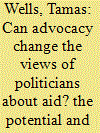

|
|
|
|
|
| Summary/Abstract |
Advocates of foreign aid in OECD countries navigate a unique form of politics. The beneficiaries of foreign aid spending have little voice in elite level decision-making about aid commitments from OECD countries. Thus foreign aid spending has a form of politics unlike other areas of policy where there is more direct budget accountability with citizens. Scholarly attention has increased on this unusual domestic politics of aid spending yet there remains little examination of the opportunities, challenges and tensions for aid organisations in advocating to elected officials. This article focuses on the case of Australian foreign aid, and the Australian Aid and Parliament project, an initiative of Save the Children. This initiative facilitates exposure visits to aid recipient countries for Australian parliamentarians. Most aid advocacy projects in OECD countries rely on mobilising citizens of those countries to act as a proxy, advocating on behalf of aid beneficiaries. This project reveals the potential of advocacy efforts that focus on the direct ‘presence’ of aid beneficiaries in the experience of elected officials (from donor countries). Yet it also reveals several challenges, and tensions between advocates, about how aid commitments change, and the most effective role for advocacy groups to play.
|
|
|
|
|
|
|
|
|
|
|
|
|
|
|
|
| 2 |
ID:
086256


|
|
|
|
|
| Publication |
2009.
|
| Summary/Abstract |
The paper reviews the experience of the group Nord-Ost (The Regional Social Organisation for Assistance and Defence of the Victims of Terrorist Acts) as an example of an NGO that has taken a rights advocacy position which has led it into confrontation with the state. Nord-Ost demands the state's accountability for the consequences of its response to the 2002 Dubrovka terrorist attack. Thus, it confronts challenges common to other rights advocacy groups in Russia today.
|
|
|
|
|
|
|
|
|
|
|
|
|
|
|
|
| 3 |
ID:
175105
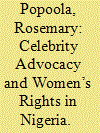

|
|
|
|
|
| Summary/Abstract |
To bring development closer to the reality of “ordinary” people, popular personalities, working on behalf of themselves, family, or organizations (profit and non-profit) in Africa have consistently given visibility to social problems to influence public opinion for positive transformation. The involvement of celebrities in development-centered issues has evoked debates from scholars in the global north who thought that their act is an extension of neoliberalism that sought to transform complex social realities into a spectacle of performance and entertainment for public amusement. While scholars in Europe and North America have engaged the intersections of celebrity advocacy and development discourse, little attention has been given to this phenomenon by their counterparts in Africa. Drawing from primary sources (including films, video, audio, newspaper articles, autobiography) as well as secondary data in the fields of sociology, women’s and gender studies, media, and popular culture, this paper examines the interrelatedness of celebrity advocacy and social reforms in Nigeria. It shows that while celebrity advocacy promotes awareness and consciousness about women’s rights, it often does not lead to protection (enforcement and change) in the socio-economic and political status of women.
|
|
|
|
|
|
|
|
|
|
|
|
|
|
|
|
| 4 |
ID:
116833
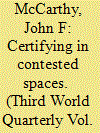

|
|
|
|
|
| Publication |
2012.
|
| Summary/Abstract |
Over recent years systems of civil or private regulation have emerged across several commodity sectors in developing countries. This paper compares two regulatory systems applied to parallel food and forestry problems: the Forest Stewardship Council (fsc) and the Roundtable on Sustainable Palm Oil (rspo). Analysing these regulatory systems as attempts to extend procedural and distributional justice into contested forested and agricultural spaces, the paper examines the paradox that, despite successful advocacy campaigns using these regulatory standards, oil palm and timber estates and associated land conflicts continue to proliferate in Indonesia. These regulatory processes provide leverage within bounded spaces, yet they are limited by an incommensurability of values and interests that reflect underlying structural problems. At best these certification schemes provide limited learning tools. Addressing the underlying problems will require legal reforms, effective state engagement and supporting forms of accountability.
|
|
|
|
|
|
|
|
|
|
|
|
|
|
|
|
| 5 |
ID:
126902
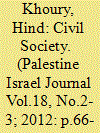

|
|
|
|
|
| Publication |
2012.
|
| Summary/Abstract |
If we contrast the era of the Arab Spring with the continuation of the prolonged Israeli occupation of the Palestinian territories and a futile peace process, now more than ever, we need a civil society that is able to mobilize the political, social, economic, cultural and human potential of our societies for social change. For it is only through a truly democratic, informed and mobilized public that we can finally overcome a culture of war, human suffering and the tenacious lack among some of the main actors of a true political will for real, just and sustainable peace.
|
|
|
|
|
|
|
|
|
|
|
|
|
|
|
|
| 6 |
ID:
130877
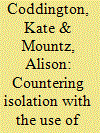

|
|
|
|
|
| Publication |
2014.
|
| Summary/Abstract |
Governments detain asylum seekers on islands across the Indian Ocean region, including Australia's Christmas Island, Papua New Guinea's Manus Island, Nauru, and across the Indonesian archipelago. Scholars and advocates alike have shown that the ambiguous jurisdiction and complex legal migration statuses that emerge in these areas, as well as their remote location and isolation, contribute to their popularity as sites of migrant detention. The negative effects of isolation and remoteness on migrants' physical and mental health, as well as their legal outcomes, have been well documented. We argue, however, that detainees and others are countering the effects of isolation with the use of technology. Ethnographic research conducted on the islands within Australian and Indonesian migrant detention networks suggests that asylum seekers detained in remote sites across the region are combating the isolation of detention with the use of mobile phones, internet access, and social media networks. They communicate with friends, relatives, legal representatives, advocates, activists, and members of the public beyond prison walls to transmit information, facilitate advocacy inside and outside of detention facilities, and construct transnational support networks. In turn, punitive policies to discipline asylum seekers by limiting methods of communication threaten these efforts.
|
|
|
|
|
|
|
|
|
|
|
|
|
|
|
|
| 7 |
ID:
079903


|
|
|
|
|
| Publication |
2007.
|
| Summary/Abstract |
Irredentism developed into an anomaly in post-World War II Europe and - contradicting the dire predictions of the 1990s - has remained an anomaly even since the end of the Cold War. Focusing on the renunciation of the FRG's and the Republic of Ireland's irredentist claims, I propose a novel route to analyse dispute settlement. I contend that nations justify their stance in a conflict. In the case of irredentism, they do not merely assert that a disputed territory is their land but justify to themselves and others why the disputed territory is rightfully theirs and why pursuing the irredentist stance is worthwhile. The disruption of this justification - what I call dejustification - constitutes a pathway to dispute settlement. Dejustification occurs through a change of the ideational environment that serves as the resource for justifying the claim and an advocacy that constructs a mismatch between environment and claim
|
|
|
|
|
|
|
|
|
|
|
|
|
|
|
|
| 8 |
ID:
128468
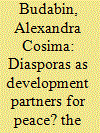

|
|
|
|
|
| Publication |
2014.
|
| Summary/Abstract |
There is increasing interest today in the relationship between diaspora groups and international development. As a stand-in for the domestic organisation in Keck and Sikkink's model of a 'transnational advocacy network', diasporas serve as important sources of legitimacy and first-hand knowledge to support the 'information politics' of host country ngos; in turn, diasporas gain access to policy making around development and conflict resolution. But these alliances present a complicated picture of power and agency with unevenness across actors. Using field research on the US-based ngo Save Darfur Coalition and its partnership with the Darfuri diaspora, I argue that a host country ngo must balance its relationships across numerous stakeholders, including the diaspora, as well as short and long-term development needs. In addition, the strength of the alliance across actors may be influenced by the status of the diaspora and the home and host country contexts.
|
|
|
|
|
|
|
|
|
|
|
|
|
|
|
|
| 9 |
ID:
152796
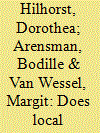

|
|
|
|
|
| Summary/Abstract |
In international development, shared ownership is assumed to be a condition for effectiveness. Academic studies question this relation, claiming shared ownership can instead lead to ineffectiveness. This study analysed the interplay between ownership and effectiveness in a transnational advocacy network for conflict prevention observed 2012–2015. Building on recent discussions about balancing unity and diversity in networks, this article unpacks the ownership/effectiveness relationship into three dimensions: collective identity, accountability processes and a shared advocacy message. We find that the question is not about more or less effectiveness, but about the processes shaping the meaning of effectiveness in particular institutional constellations.
|
|
|
|
|
|
|
|
|
|
|
|
|
|
|
|
| 10 |
ID:
131511


|
|
|
|
|
| Publication |
2014.
|
| Summary/Abstract |
Through a series of focus groups with human security practitioners, we examined how powerful organizations at the center of advocacy networks select issues for attention. Participants emphasized five sets of factors: entrepreneur attributes, adopter attributes, the broader political context, issue attributes, and intranetwork relations. However, the last two were much more consistently invoked by practitioners in their evaluations of specific candidate issues. Scholars of global agenda setting should pay particular attention to how intranetwork relations structure gatekeeper preferences within transnational advocacy spaces because these help constitute perceptions of issues' and actors' attributes in networks.
|
|
|
|
|
|
|
|
|
|
|
|
|
|
|
|
| 11 |
ID:
132751
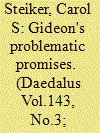

|
|
|
|
|
| Publication |
2014.
|
| Summary/Abstract |
The landmark case of "Gideon v. Wainwright" (1963) ensured the right of criminal defendants across the country to the effective assistance of counsel, but the overwhelming consensus is that the promise of "Gideon" has not been kept. Although there are significant differences in the delivery of indigent defense services across the country, there are four general reasons for the failure of "Gideon" that obtain across every jurisdiction and collectively cover much of the explanatory terrain: 1) its mandate is inadequately and precariously funded; 2) institutional impediments have impinged on the independence, training and oversight, and advocacy culture of indigent defense counsel; 3) legal remedies for ineffective assistance of counsel are often inadequate, inaccessible, or both; and 4) the ubiquitous practice of plea bargaining shields inadequate representation from view or remedy. Vindicating the right of poor people to effective representation in criminal cases remains a daunting but enormously important task.
|
|
|
|
|
|
|
|
|
|
|
|
|
|
|
|
| 12 |
ID:
131712
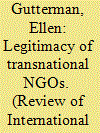

|
|
|
|
|
| Publication |
2014.
|
| Summary/Abstract |
This article develops theoretical insights concerning the legitimacy of non-profit Transnational Non-Governmental Organisations (TNGOs) in global governance. The research compares the advocacy initiatives of Transparency International (TI), the leading TNGO in the international regime of anti-corruption, in Germany and France during the 1990s. The main argument is that the legitimacy of TNGOs is a relational concept: it is granted or denied in a relationship between at least two parties, in which actor attributes play a role but are not decisive. Only such a relational conception can explain why a given TNGO is granted legitimacy in one context and denied it in another. In addition, legitimacy matters. Although insufficient on its own, legitimacy is a necessary condition for effective advocacy, which TNGOs can generate endogenously. To the extent that the legitimacy of TNGOs depends on their acceptance by dominant groups and powerful decision-makers, therefore, 'legitimate' TNGOs may function to sustain rather than challenge the structures of power which condition global outcomes in ways that are often contrary to the goals of equality, fairness, and justice. Thus to assess the impact of TNGOs in global governance, one must examine which TNGOs have been granted (or denied) legitimacy and influence, and why.
|
|
|
|
|
|
|
|
|
|
|
|
|
|
|
|
| 13 |
ID:
122304
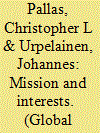

|
|
|
|
|
| Publication |
2013.
|
| Summary/Abstract |
International advocacy campaigns allow the concerns of disadvantaged groups in developing countries to reach policymakers. However, recent research has challenged the motivations of the Northern nongovernmental organizations involved and raised concerns about the impacts of North-South NGO partnerships on Southern NGO control. This article addresses these concerns by developing a typology of NGOs based on their financial incentives and the rigidity with which they adhere to their established organizational mission. It then models interactions between NGOs of different types as a strategic game. In the game, NGOs decide whether to enter international campaigns and, if so, manage campaign function to maximize payoff. "Participation-oriented" Northern NGOs, whose supporters reward them for undertaking advocacy, were found to run lengthy but ineffective campaigns and focus on publicity. "Outcome-oriented" groups, whose supporters reward them for measurable achievement, were found to generate higher campaign intensity but exit after either early victories or costly difficulties. The model is illustrated with a comparative analysis of two different campaigns regarding the Narmada Dam project.
|
|
|
|
|
|
|
|
|
|
|
|
|
|
|
|
| 14 |
ID:
087683
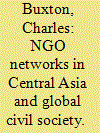

|
|
|
|
|
| Publication |
2009.
|
| Summary/Abstract |
Based on research carried out by INTRAC (International NGO Training & Research Centre) in 2006-2007 in four countries of Central Asia for Oxfam-Novib, the article investigates NGO networks and their international links in the context of current theory on civil society and global civil society. Three case studies of NGOs working in service delivery, community development and free media are examined to show the diversity of aims and the potential and challenges of networking in the region. Civil society advocacy at national and international levels is analysed with a fourth case study on the campaign conducted in Kyrgyzstan against joining the World Bank's Highly Indebted Poor Countries programme. This example shows a more radical, alternative mode of civil society activism. The article emphasizes the importance of national- and regional-level networking and poses the question of whether NGOs in Central Asia can shift from their current positions on the periphery of global movements and debates.
|
|
|
|
|
|
|
|
|
|
|
|
|
|
|
|
| 15 |
ID:
175146
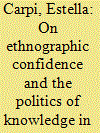

|
|
|
|
|
| Summary/Abstract |
Fieldworkers in politically sensitive spaces traditionally need to negotiate their presence in the field with local (in)formal authorities and epistemic power-holders. I illustrate how attempts at both holistic politicisation and neutralisation of the research space can question ethnographic knowledge production. Drawing upon the anthropology of silence and agnotology, I interrogate the whats and hows of ethnographic authority and local validation of ethnographic research when political and epistemic powers complexly and discontinuously overlap. By examining how knowledge is boasted about, concealed or questioned by political and humanitarian actors, I examine the ways in which a lack of political protection, as well as overt advocacy, shape different modalities of access – or lack of access – to the field. Against the backdrop of a growing body of literature on the ethics of research in settings affected by political transformations and emergency crises (such as today’s Arab Levant), I try to upend ethnographic confidence as a self-centred process of knowledge production. I instead rethink it not only as an ethical but also an inter-subjective effort towards a more effective integration of the counter-epistemologies of field interlocutors into our own research.
|
|
|
|
|
|
|
|
|
|
|
|
|
|
|
|
| 16 |
ID:
190674
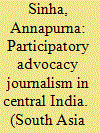

|
|
|
|
|
| Summary/Abstract |
This case study of a community newspaper, Namaskar, and its impact in ‘underdeveloped’ areas of coastal Odisha in India, discusses the potential of alternative media for social change. It scrutinises and analyses the participatory advocacy activities of Namaskar. Studying participatory journalism favours a more dialogical and reflexive approach, which also draws on ideas of ‘critical’ and ‘radical’ media, while also calling attention to the significance of content in bringing about social change. Building on observations and testimonies from the field, collected through multiple qualitative methods for data collection, the study infers that Namaskar ensures significant participation in its advocacy practices, leading to observable changes in and around its catchment area. However, basic gatekeeping and editing work to make news copy print-ready also restrain the extent of ‘absolute participation’.
|
|
|
|
|
|
|
|
|
|
|
|
|
|
|
|
| 17 |
ID:
193479
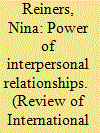

|
|
|
|
|
| Summary/Abstract |
This article further develops and illustrates the argument that relationships between individuals help to explain the success of human rights advocacy in international institutions. Drawing from advocacy theory and socio-legal studies, I shift the attention from collective forms of advocacy to the importance of interpersonal relationships of advocates with individuals in international institutions to influence the development of human rights. I introduce a framework consisting of three analytical steps – mapping the key actors in a network, process-tracing, and biographical research – and apply the framework to three cases of norm development by a United Nations human rights treaty body. My findings highlight the power of interpersonal relationships for the making of human rights, and they inform scholarship on transnational elites, human rights advocacy, and the politics of international law.
|
|
|
|
|
|
|
|
|
|
|
|
|
|
|
|
| 18 |
ID:
151730
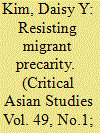

|
|
|
|
|
| Summary/Abstract |
Since 2006, marriage migrants and their so-called multicultural families have been the recipients of considerable public resources and attention in the Republic of Korea. Thus, it could be said that marriage migrants constitute a relatively privileged group of migrants in South Korea. Yet significant human rights abuses, including domestic and sexual violence, widespread discrimination, and poverty, indicate that marriage migrants continue to face various forms of legal, social, and institutional precarity. By evaluating the specific trajectories by which human rights activists and organizations mobilize in the name of migrant rights, this paper argues that human rights-based activism has not been an effective means of mobilizing resistance to migrant precarity because of its failure to address precarity as a multi-layered and multi-sited reality. In consequence, marriage migrants in South Korea have turned to alternative methods for mobilizing resistance to precarity.
|
|
|
|
|
|
|
|
|
|
|
|
|
|
|
|
| 19 |
ID:
163483


|
|
|
|
|
| Summary/Abstract |
cholarship on Chinese civil society has produced rich empirical studies, but there have been few attempts to theorize the empirical knowledge acquired. Moreover, the question of how to conceptualize the political agency of civil society in a non-democratic context has received limited systematic attention. In this conceptual article, we draw on a discursive approach to politics to analyse the political agency of Chinese civil society. Our analysis is based on synthesizing insights gained through three separate research projects. We propose a conceptual framework which focuses on how civil society actors position themselves within a structured political space, how they represent social groups and issues through advocacy, how they care for these groups, and how they engage in processes of identity formation. Taken together, these four modalities constitute a framework for analysing the different political dimensions of civil society agency.
|
|
|
|
|
|
|
|
|
|
|
|
|
|
|
|
| 20 |
ID:
122667
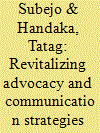

|
|
|
|
|
|
|
|